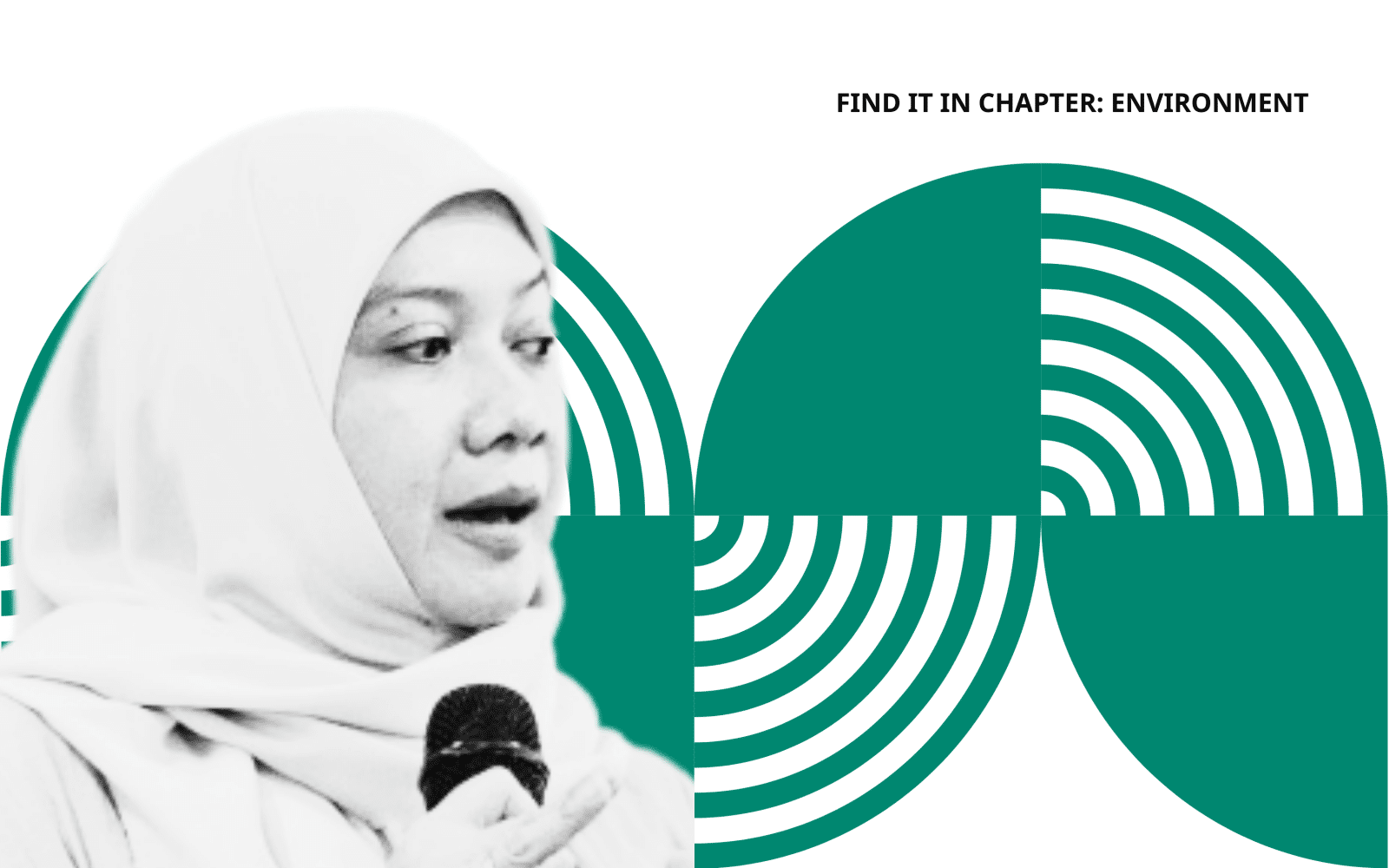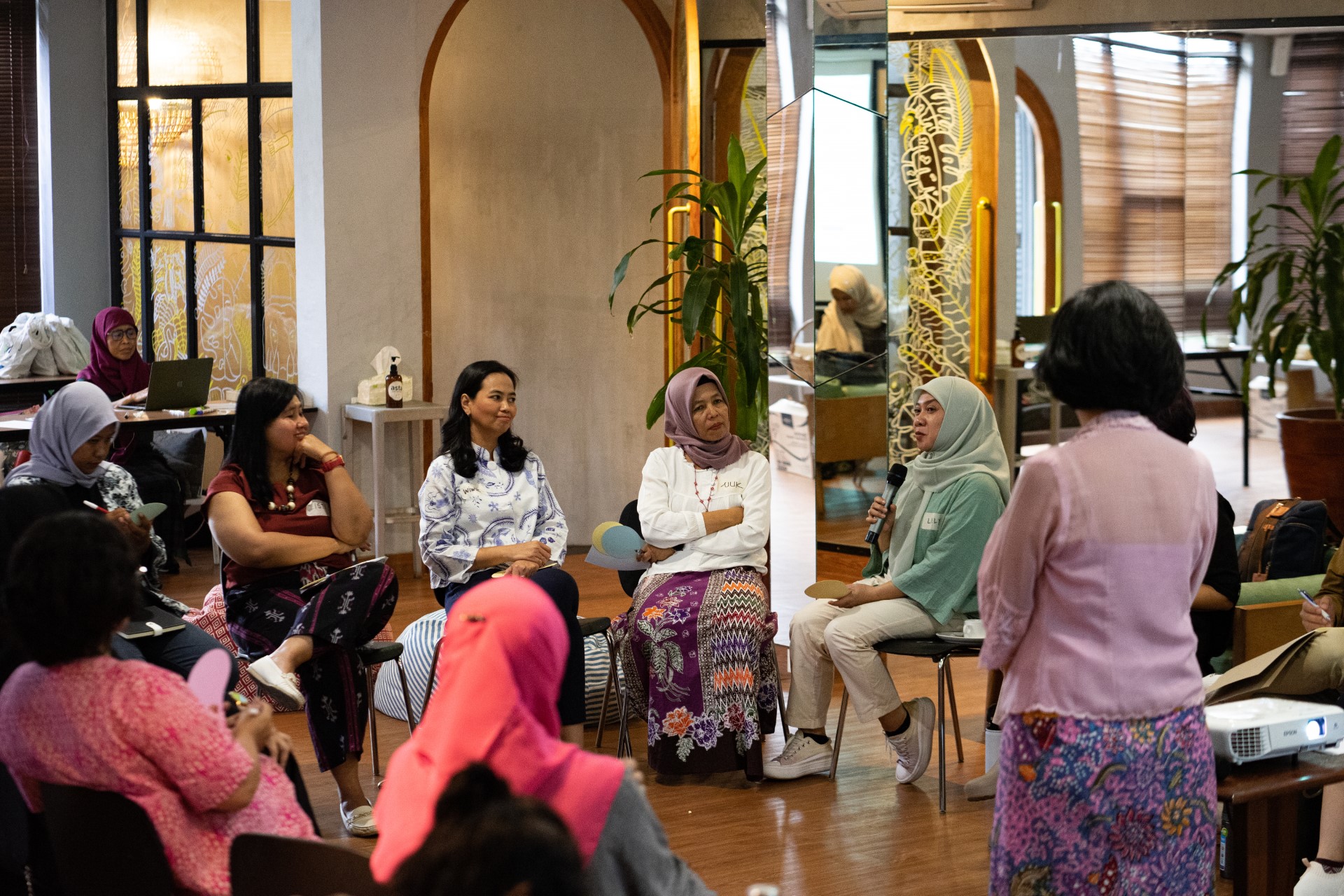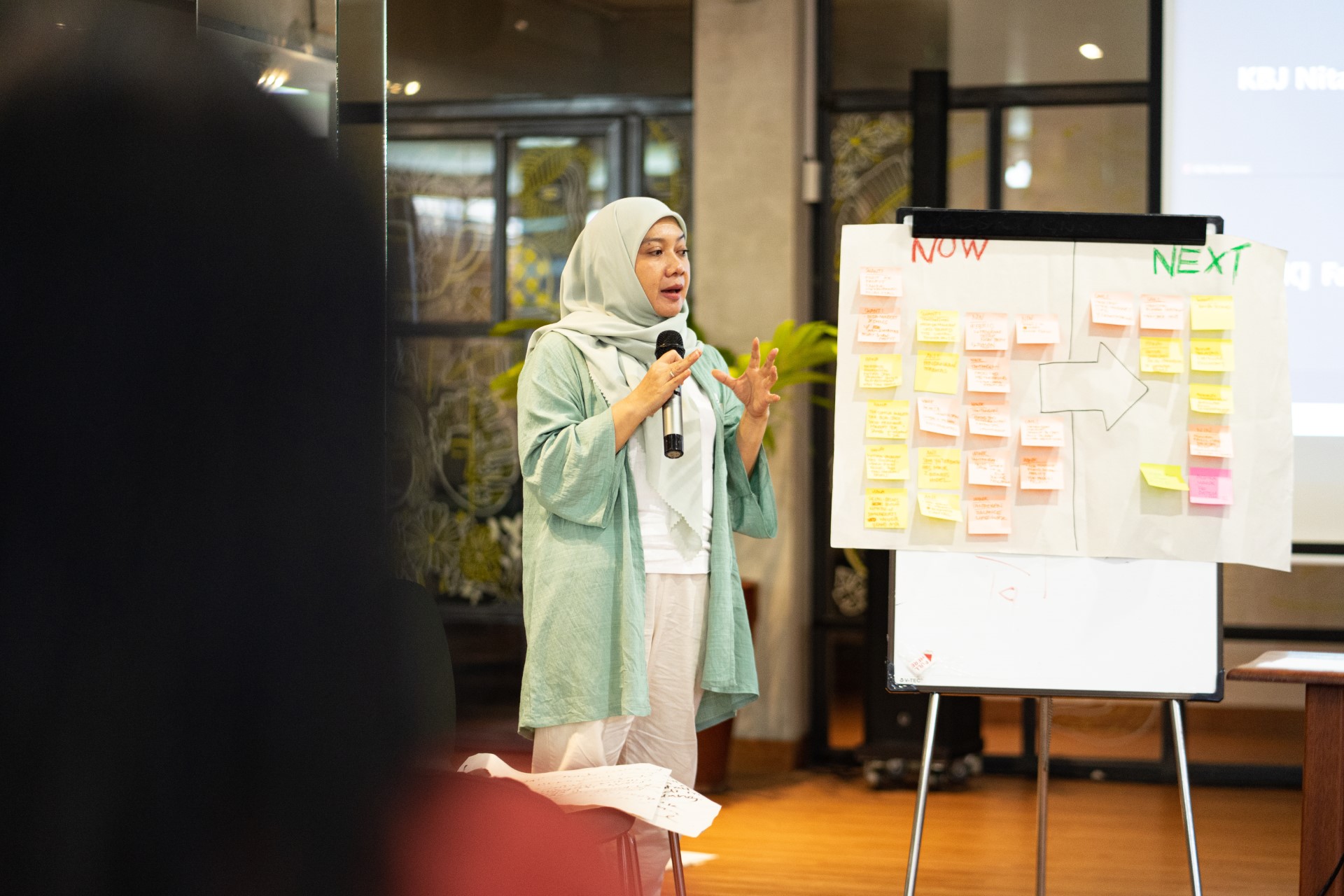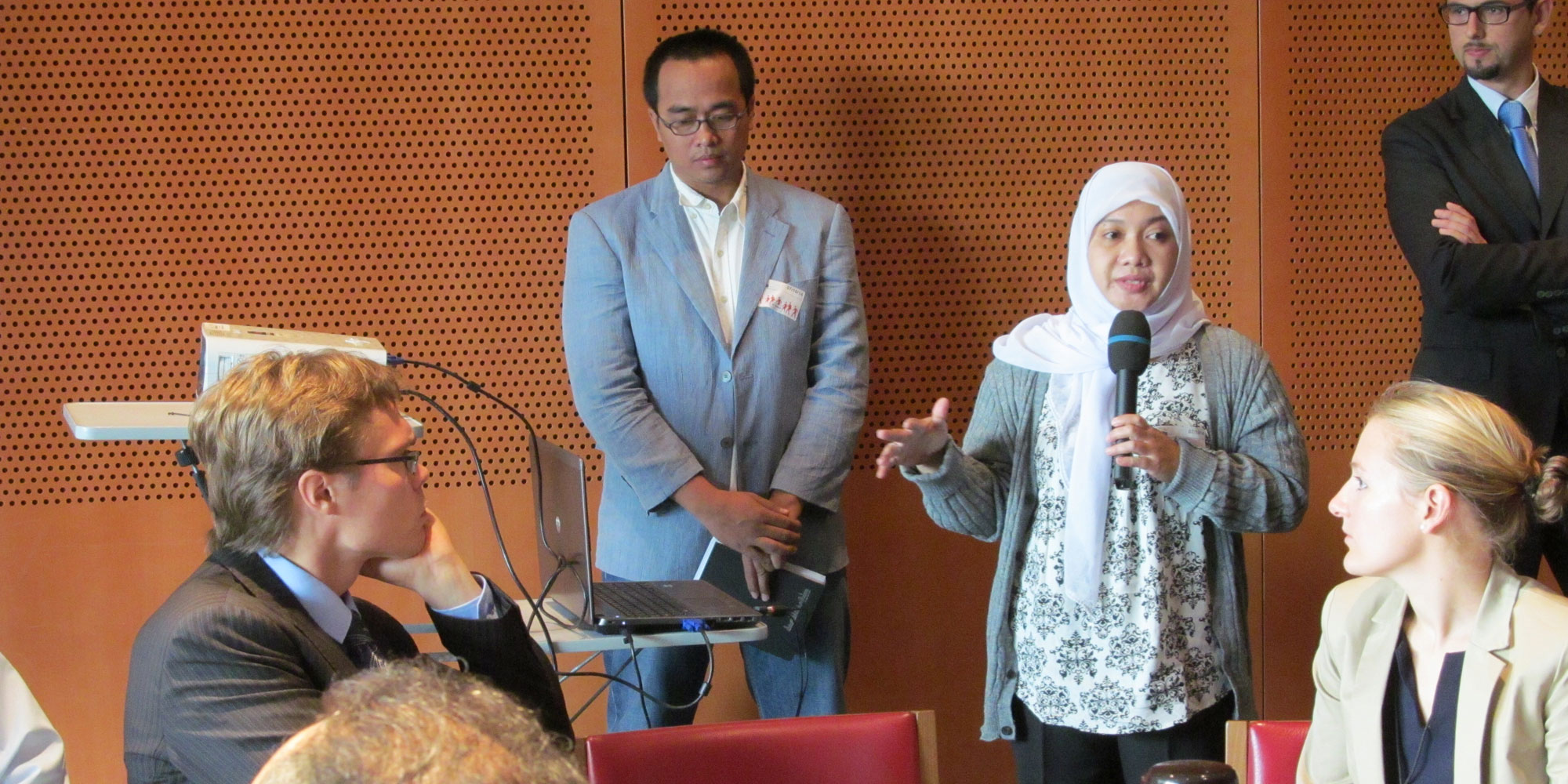Laili Khairnur
Executive Director, Gemawan
Fellow project website: www.gemawan.org
Laili trains women from different ethnic and religious groups to collaborate to improve family income and agricultural practices. As their collaborations succeed, women become recognized as community leaders, who then work across boundaries to protect natural resources, establish land rights, and prevent and defuse social and political conflict.

THE NEW IDEA
Laili organizes women across ethnic and religious divides to work together to improve their family income and food security in the West Kalimantan province of Indonesia. In building and connecting these women’s groups Laili is subtly addressing the interplay of ethnic, religious, and land ownership divisions in her region. As women from differing backgrounds begin to accomplish positive change for their communities, they build trust in each other. As they demonstrate their achievements, they become recognized as leaders, a rare distinction in the traditional, patriarchal culture of the region. They begin to contribute to decision-making for their communities. Women are then able to address larger issues of land use and natural resource management with legitimacy and impact. Importantly, their cross-cultural partnerships position them as peacemakers. The trust they develop in each other enables them to prevent or respond to conflict when it arises between larger communities.
Indonesia is vulnerable to conflict, at times violent, due to land, wealth, and power disparities, as well as ethnic and religious identity issues. Of particular importance is how land is allocated and used and who has the power to decide. Women in Laili’s groups are increasingly able to influence natural resource management and secure land rights for their communities against annexation by corporations. This is significant for a region where land rights are often contested and which has been targeted by the Indonesian government for large-scale palm oil production, threatening local ownership, use, and cultural meaning.

Laili’s grassroots groups have used their new authority to do land surveys of their communities to establish clear title for previously untitled farmers, to set up credit unions that provide financing to farmers and fishers without regard to ethnic or religious identity, and to protect vital peatland and mangrove areas by implementing new regulations that allocate land use based on zoning.
Laili also connects these grassroots organizations with national and global public campaigns to protect forest and water resources from large-scale palm oil plantation development. Together with a network of civil society groups, Laili and her organization, Gemawan, successfully challenged the World Bank’s International Finance Corporation (IFC) to change its investment strategies in the palm oil sector and to halt financing to some companies.
To buttress conflict prevention, Laili and her network of community women leaders are introducing the tools of democratic citizenship across the domains they work in. They have trained regional governments on transparent decision-making and on applying field data, gathered by citizens, to ensure fair access to land. Gemawan has also helped local governments set up regulations that require companies seeking permits to obtain community consent before taking over land.
By starting in areas of common concern for women -- family income and food security -- Laili is positioning women as leaders in arenas where they will not be seen as challenging traditional male authority. Women in her networks are then able to build on their successes and expand their activities to address problems further up the chain: Natural resource use, land rights, access to financing, and conservation. Laili and her networks are now expanding their work to universities and Islamic schools to provide training in sustainable agriculture and democratic decision-making to younger Indonesians.
"Gemawan is currently identifying innovators at the local level to become actors of change.”
KalbarNews
THE PROBLEM
West Kalimantan, on the island of Borneo, is facing an unprecedented loss of rainforest due to development and agriculture. This is exacerbated by a lack of policies around natural resource management or poor imple-mentation of those that exist. Regional spatial planning, which zones areas for productive use, as protected or customary land, or under individual ownership, has not been available there.
Corruption is rife. It is still common for land conces-sion-holders to tamper with documentation in order to annex land from local people. An additional challenge is that large businesses seeking to operate in the region are supported by powerful global institutions like the IFC.
"Since 2010, Gemawan has tried to work on spatial planning issues in order to strengthen communities’ activities on land rights and commodity protection.”
Forest Peoples Programme
To ethnic minorities like the Dayaks and others who call Kalimantan home, the rainforest provides not just an economic resource but a cultural identity, and many fear that along with the diminishment of the forest, their culture will also dwindle. As the government plans to center Indonesia’s palm oil production in West Kalimantan, forests and agricultural land cultivated by small farmers with no ownership certificates would be converted into palm oil plantations. On paper, this land is considered idle or unproductive, making it easier for the government to dispossess indigenous people of their land.
Land disputes and discrimination between different eth-nic groups complicate the situation and have prevented these groups from working together against threats from outside. Immigration policies during the Suharto regime in the 1980s encouraged migration to the region, which led to competition with indigenous communities for land and resources and triggered communal conflicts.
In the past two decades, Indonesia has witnessed epi-sodes of violent conflict in West Kalimantan, as well as in the provinces or cities of Maluku, Poso, and Papua. In West Kalimantan, over a thousand people died and hun-dreds of thousands were internally displaced. Millions of people continue to live with trauma from the violence and community disintegration and continue to face stigma and stereotyping. This has had ripple effects in other aspects of life. For example, because of prejudices against Dayaks and Catholics, people from these com-munities are less able to access financial services from the main local credit union due to quiet discrimination.
Women who have made attempts to build peace have not been listened to, due to their traditionally subordinate role, especially around public matters. Women’s political participation is limited by the deeply rooted patriarchal culture. In the traditional culture of West Kalimantan, men lead, and women are behind the scenes, especially around natural resource management. Women have lim-ited access to and control of resources and no voice in de-cision-making, even as their communities face dramatic environmental changes threatening their livelihoods and homes.
THE STRATEGY
When faced with this pressing environmental issue, Laili realized that progress could only happen if land use, ethnic tension, and women’s rights were all addressed together. She saw potential in making women key to tackling these overlapping issues.
Laili is building a network of women’s groups at different levels and strengthening them with knowledge, skills, attitudes, and behaviors to exercise and defend their democratic rights and responsibilities in society.
She began by organizing small groups of women to partner in health and income-generating activities, such as vegetable gardening and planting black rice. Laili chose these activities as an entry point so that her work would not be perceived as a threat by spouses or traditional male village leaders. Vegetable gardening also contributes to meeting both a family’s needs and community food sovereignty. It sustains and protects local indigenous food crops that are environmentally friendly and gives respect to the variety of local foods.
Laili then provided these women with civic education to help them organize to protect their land and forests. Since these groups had proven themselves to the larger community and male authorities, showing the women as key contributors to their families’ economy and livelihood, the reaction of the rest of the community, especially from village leaders, was largely positive. The women received an introduction to political and economic sovereignty and leadership training, and, over time, began to take on leadership roles in the community. Now, in each of the villages, there is a vibrant and active women’s group demonstrating leadership.
"Gemawan is experienced in building community organizing, inclusive community groups which further strengthens local capacity with knowledge and ability to empower the community. This makes it possible to build democratic decisions about what is desired collectively at the local and community level.”
Equator Initiative
Laili connects the women’s groups at the district and provincial levels. She has established fifty village women’s groups across 250 villages, as well as networks in ten cities or districts across West Kalimantan. These groups are now being replicated in other provinces across the Sumatra Island region. Gemawan has grown to a staff of 35 across four branches and mobilizes up to 50 volunteers from the communities and nearby universities. In the near future, Laili plans to set up a training and learn-ing center in West Kalimantan and in new provinces and establish Gemawan as a “Center of Excellence” for education in multiple domains.
Addressing ethnic and religious prejudices and social stigma, Laili applies inclusive practices. She sets diversity in gender, ethnic, and religious backgrounds as one of Gemawan’s organizational principles. She also brings the different ethnic groups to work together in social forestry and advocacy activities, which over time has broken down religious stereotypes and stigma, and mitigated community disintegration.

Additionally, Laili set up a new credit union to break down discrimination and provide access to financing for a net-work of farmers and fisherfolk groups that Gemawan has assisted. Gemawan has now set up two additional credit unions in the province.
To aid reconciliation from previous conflicts in the area, Laili has delivered humanitarian support to refugee camps through Gemawan and helped mediate reconciliation between refugees and local indigenous groups. Now, the refugees have begun to set up their own villages within the refugee camps, as the local Dayak and Sambas people are becoming more welcoming.
Gemawan joins with women and community leaders to advocate for policy development at the village level, par-ticularly around measures that help citizens codify their land titles, which have often been observed informally before. This effort aims to prevent land disputes among community members and companies as it uses village authority to map regional lands. Gemawan facilitates this mapping using drone technology to produce more accurate maps.
Laili’s networks also campaign for new laws in natural resource management. In a partnership with two district governments, Gemawan trained village facilitators to oversee policy processes and strengthen community participation to ensure fair access to land and forest use.
To further this advocacy at higher levels, Laili built a network of civil society organizations, the Coalition for Sustainable and Just Spatial Management, in 2013. The Coalition advocated for provincial regulation to secure and protect the rights to forests and land of indigenous and local communities against the expansion of palm oil, timber plantations, and mining companies.
To increase transparency, the Coalition initiated a public review of any draft regulations, which has become a new practice in West Kalimantan and nationally. The Coalition has also been able to establish regulations to allocate land based on zoning, which includes protecting peat-land and mangrove forests from conversion to palm oil plantations.
To educate young volunteers, Laili partnered with universities to establish the Youth School for Politics and Democracy. Laili also partners with Islamic boarding schools and has set up the Learning Center and Home Garden Development program to provide concrete learn-ing on land management practices. Six Learning Centers and 24 support home gardens have been established in 24 locations.
To further transparency, Laili also helps communities monitor existing concession permits or use of land by outside actors, using drone and GIS (Geographic Information System) technologies. To support this field monitoring, Laili set up a complaint mechanism for villagers. When field data from villagers is received, Gemawan can analyze and compare whether sustainability claims by companies match with field data and identify discrepancies. With this mechanism, Laili is enforcing the anti-corruption movement and advocacy for good and clean governance. The Coalition has also trained government officers on managing concessions, including monitoring companies that perpetuate unsustainable practices.
Additionally, when companies or actors want to obtain a land use permit, they now must implement a free, prior, and informed consent procedure to ensure they obtain meaningful consent from community members before taking over their land.
Laili also conducts global campaigns and participates in global environmental networks. In one significant case, she used field data and identified herself as the local victim, to challenge unsustainable practices and illegal annexation of palm oil plantation lands by Wilmar In-ternational. Wilmar, a global agribusiness conglomerate, had financing from the World Bank. Engaging with global NGOs, Laili brought the Wilmar case to the IFC to demand a two- to three-year pause on global lending in order to restore environmental and social safeguards. Because of this campaign, the IFC changed its investment policies and strategies in the palm oil sector. Laili currently sits on the Roundtable on Sustainable Palm Oil (RSPO) to demand investors and companies practice sustainability. This strategic litigation model has been replicated to address mining issues and has also been used as a best practice reference in Sarawak, Cambodia, the Philippines, and Latin America.
THE PERSON
Laili Khairnur was born in 1975 to a Malay family, in a poor and multiethnic village community by the border with Malaysia. She was raised mostly by her father, a school headmaster, after her mother passed away when Laili was just eleven. Young Laili healed herself and passed through the hardship, which made her an independent girl facing life without a mother. She learned empathy and perseverance from her father, a role model to her in bringing about peace in a multiethnic community. She learned from his struggle with an authoritarian government when, despite being a civil servant, he affiliated himself with a non-ruling party.

Living in a multicultural and multi-religious community taught Laili to respect differences from a young age. She learned that every religion teaches goodness. During her teen years at an Islamic boarding school, Laili witnessed discrimination by the community against her Madurese friends. Due to poverty, many of them had to drop out of school and work as household maids in Malaysia. Interethnic communal violence hit her village of Sambas in 1997, and later, Sampit in 1999. In a pivotal moment, she recalls that her father saved the life of her Madurese neighbor by helping her flee the village. To Laili, religious conflicts jeopardize respect for difference and diversity. So she decided to do something about it.
Laili went to study in Yogyakarta in 1993, at IAIN Sunan Kalijaga Yogyakarta, an Islamic university. Moved by her father’s advice to care for other people, especially those in need, Laili was an eager volunteer during college. She was very active in the Muslim Student Association or HMI. With her female colleagues, she spoke about citizenship and traditions in Islam that made sure men were always chosen as leaders. It was a relatively new topic that wasn’t of interest to most women. Yet Laili nominated herself to be the chairperson of the HMI branch in Yogyakarta when it was still uncommon for women to nominate themselves. During her study years there, Laili was also active in working with non-Muslim communities, including Catholic nuns. Laili believed that women could be front-line leaders to keep the peace, but their voices were going unheard. She also learned that the ethnic conflict was triggered by the threats over their land. So, together with her girlfriends from all different ethnicities (Dayak, Chinese, and Malay), in 2009 she set up a Women’s Coalition for Gender, Justice and Peace. She also joined the Women’s Alliance for Gender Study to hold congresses voicing women’s insights on peace-making and reconciliation of ethnic conflicts in Kalimantan.
Upon returning to her hometown of Pontianak she joined Gemawan as a volunteer in 2001, when it was the first peace-building institution in West Kalimantan. As an intern she established a new women’s division and integrated gender into the organization’s vision and mission in 2005, transforming Gemawan into a women-led organization. Although most CSOs were dominated by men, Laili was accepted and trusted by local activists and was later elected as the Executive Director of Gemawan in 2008, due to her strong leadership and commitment. International research communities began to take note of Laili’s experience with Gemawan, and now she and Gemawan are working with global researchers to share local knowledge internationally.